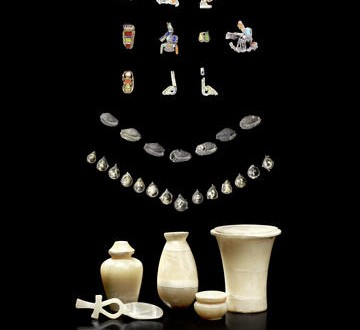
New York: 4,000-year-old Egyptian relics purchased by the Metropolitan Museum of Art
New York’s renowned Metropolitan Museum of Art has purchased a collection of Egyptian artifacts, discovered a century ago by famed British archaeologist Sir William Matthew Flinders Petrie and deemed to be over 4,000 years old, thereby averting a much-criticized plan to auction off the artifacts.
The Treasure of Harageh consists of 37 items including flasks, jewelry inlaid with rare minerals and vases. The relics date back to approximately 1900 B.C., and were excavated from a tomb near Fayum. Portions of the antiquities were given to sponsors of the dig from St. Louis in 1914.
The planned auction had been criticized by British and US historians who feared the loss of the collection to the private marketplace. Renowned British auction house Bonhams cancelled plans of the auction and announced the new deal – the purchase price has not been disclosed, but the antiquities are valued at $200,000.
The previous owners of the collection were the St. Louis Society of the Archaeological Institute of America; it was housed at the St. Louis Art Museum, Washington University in St. Louis before being moved to private storage a few years ago.
The planned auction provoked the archaeological institute’s head office to criticize the independent St. Louis chapter in a statement that cited its “firmly expressed ethical position concerning the curation of ancient artifacts for the public good”.
Curator of the Petrie Museum of Egyptian Archaeology in London Alice Stevenson said that the sale to a private individual would have violated an agreement between explorer William Flinders Petrie and the St. Louis group, which stated that the antiquities must be in public museums, where they are accessible to both the public and to researchers.
“Museums and archaeologists are stewards of the past. They should not sell archaeological items in their collections for profit”, Stevenson said.
Such auctions could put other antiquities at risk by “providing incentives for global criminal activity that can lead directly to the loss of the art they claim to value”, she added.
 The Arab Democrat The Latest From The Arab World
The Arab Democrat The Latest From The Arab World





